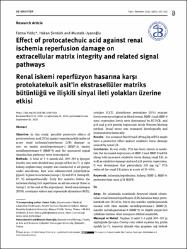Effect of protocatechuic acid against renal ischemia reperfusion damage on extracellular matrix integrity and related signal pathways
Abstract
Objective: In this study, possible protective effects of protocatechuic acid (PCA) against experimentally-induced acute renal ischemia/reperfusion (I/R) damage in rats, on matrix metalloproteinase-2 (MMP-2), matrix metalloproteinase-9 (MMP-9) and the associated signal transduction pathways were investigated.
Methods: A total of 3-4 month-old, 200-250 g Sprague Dawley rats were divided into groups of five (n=7). A right kidney nephrectomy surgery was conducted to all groups under anesthesia. Rats were administered polyethylene glycol 1 h prior to ischemia (Group I, II) and PCA (Group III, IV, V) intraperitoneally. Forty five minutes before the ischemia during 24 h reperfusion on all rats except those in Group I. At the end of the experiment, blood urea nitrogen (BUN), creatinine values and superoxide dismutase (SOD), catalase (CAT), glutathione peroxidase (GPx) enzyme levels were investigated in blood serum. MMP-2 and MMP-9 gene expression levels were determined by RT-PCR, and p38 and p-p38 protein expression levels Western blotting method. Renal tissue was examined histologically and immunohistochemically.
Results: It is assumed that 80 and 120 mg/kg of PCA might have a protective effect against oxidative stress damage caused by renal I/R.
Conclusion: In our study, PCA has been shown to modulate the increased expression of MMP-2 and MMP-9 mRNA along with increased oxidative stress during renal I/R, as well as oxidative damage-induced p38 protein expression. It was determined that particularly 120 mg kg(-1) PCA reduced the renal I/R injury at a rate of 35-45%.
Source
Turkish Journal of Biochemistry-Türk Biyokimya DergisiVolume
46Issue
3URI
https://hdl.handle.net/20.500.12868/1613https://www.degruyter.com/document/doi/10.1515/tjb-2020-0113/html


















